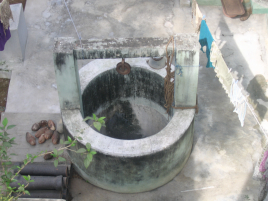Eco-Certification Proposed for ISKCON Temples in India
By Madhava Smullen | May 15, 2010

Spiritual teacher Bhakti Rasamrita Swami is heading up a new effort to introduce an internal system of eco-friendly certification for ISKCON temples in India.
Swami, who took sannyasa—the renounced order of Vaishnavism—this March, has a solid background of both ISKCON management and environmental proactiveness. Having served consecutive terms as president for ISKCON temples in Vrindavana and Belgaum, Karnataka, he is now one of the main forces behind Belgaum’s 500-acre Vedic Farm Community.
So his inspired verbal-only presentation at the biannual ICC (ISKCON’s Indian Continental Committee) meetings on March 30th in Delhi—despite being completely off the cuff—was taken very seriously by his audience of 80 temple presidents, GBCs and leading managers from all over India.
Others got to see his ideas three weeks later when his short paper “Making ISKCON Temples Eco-Friendly” was released to the web via various ISKCON sites.
“Each step is very important,” says Bhakti Rasamrita Swami, speaking about the ten areas to focus on in making temples “green” outlined in his paper. “Materials, energy, water, methods, waste management, food, trees/greenery, health, audit, and creating awareness. But the kind of materials we use are particularly crucial. We needn’t use heavy, energy intensive materials for construction or for our everyday needs—there are alternatives.”
Acting on their words, the project’s research team headed by Vrindavana environmental activist Nirguna Dasi is compiling a directory of such bio-degradable alternatives and where to get them, so that temples will be able to easily replace commonly-used pollutants such as plastic bags, pesticide, and plastic and Styrofoam dinnerware. Eco-friendly cleaners and paints will also be recommended.
“Water is an equally, if not more, crucial area,” Bhakti Rasamrita Swami adds. “Water levels, especially in India, are plummeting, and lack of this precious resource is going to be one of the major problem areas in the world. So we must conserve water, harvest rain-water, and develop excellent water resource management.”
Again, Swami’s research team will suggest water-harvesting and water-purifying techniques for ISKCON temples to adopt. It will also suggest alternate energy sources, organic foods, and means for segregation and proper disposal of waste.
Of course, not all ISKCON temples may be willing or even able to follow all of these recommendations, a fact which Bhakti Rasamrita Swami is well aware of. His paper suggests five levels of environmental commitment, with level one being the minimum standard and very easy to implement—conserving water and avoiding the use of plastic bags and dinnerware—and level five being the highest standard for a green temple in an urban setting. Possible sixth and seventh levels could be applied to rural projects where higher standards are feasible.
“The idea is that eco-friendliness should not be very expensive or difficult to implement, but something very practical and doable,” Swami says. “That way, temples will be motivated to act.”
The paper “Making ISKCON Temples Eco-Friendly” has already generated plenty of interest and offers of help and support. A sub-committee of interested devotees has been formed, while ISKCON Chennai president Sumitra Krishna Dasa is working with a local environmental expert to create a blueprint for the project. Meanwhile, research coordinator Nirguna Dasi is also contacting other experts. All these separate volunteers will then convene later in the year to combine their research, which they will use to make a second, more detailed proposal to the ICC in October.
“We are simply making suggestions,” Nirguna says. “It will be entirely up to the ISKCON leaders whether or not to accept and adopt them.”
Bhakti Rasamrita Swami, of course, hopes to make use of his regular travels to encourage interested leaders.
“The environment is a burning issue in the world today that, as a worldwide reputed institution, we cannot ignore,” he says. “However, it is also a very important aspect of spiritual vision. ISKCON’s founder Srila Prabhupada used to give the example that if we saw his spectacles on the table, we would immediately think of him, because we would know ‘These are Prabhupada’s spectacles.’ Similarly, when a devotee looks at nature, he thinks of Krishna, because nature is Krishna’s creation.”
Extending the analogy, Bhakti Rasamrita Swami adds, “Let’s suppose I was cleaning the table that had Prabhupada’s spectacles on it. I would carefully fold them and keep them aside respectfully, because I know they belong to Prabhupada, right? I wouldn’t just brush them off the table onto the floor—that would be disrespectful to Srila Prabhupada. In the same way, to exploit and mistreat nature means to disrespect Lord Krishna. So being environmentally-friendly can actually help us to develop spiritual vision.”
If Bhakti Rasamrita Swami’s proposed system is adopted by Indian ISKCON leaders, temples adhering to one of the five levels of eco-friendliness will receive an internal certification. External certification may also be sought, but is not currently a component of the project.
To find out more or to contribute to research, please contact NirgunaACBSP@pamho.net or nirgunadasi@gmail.com.














